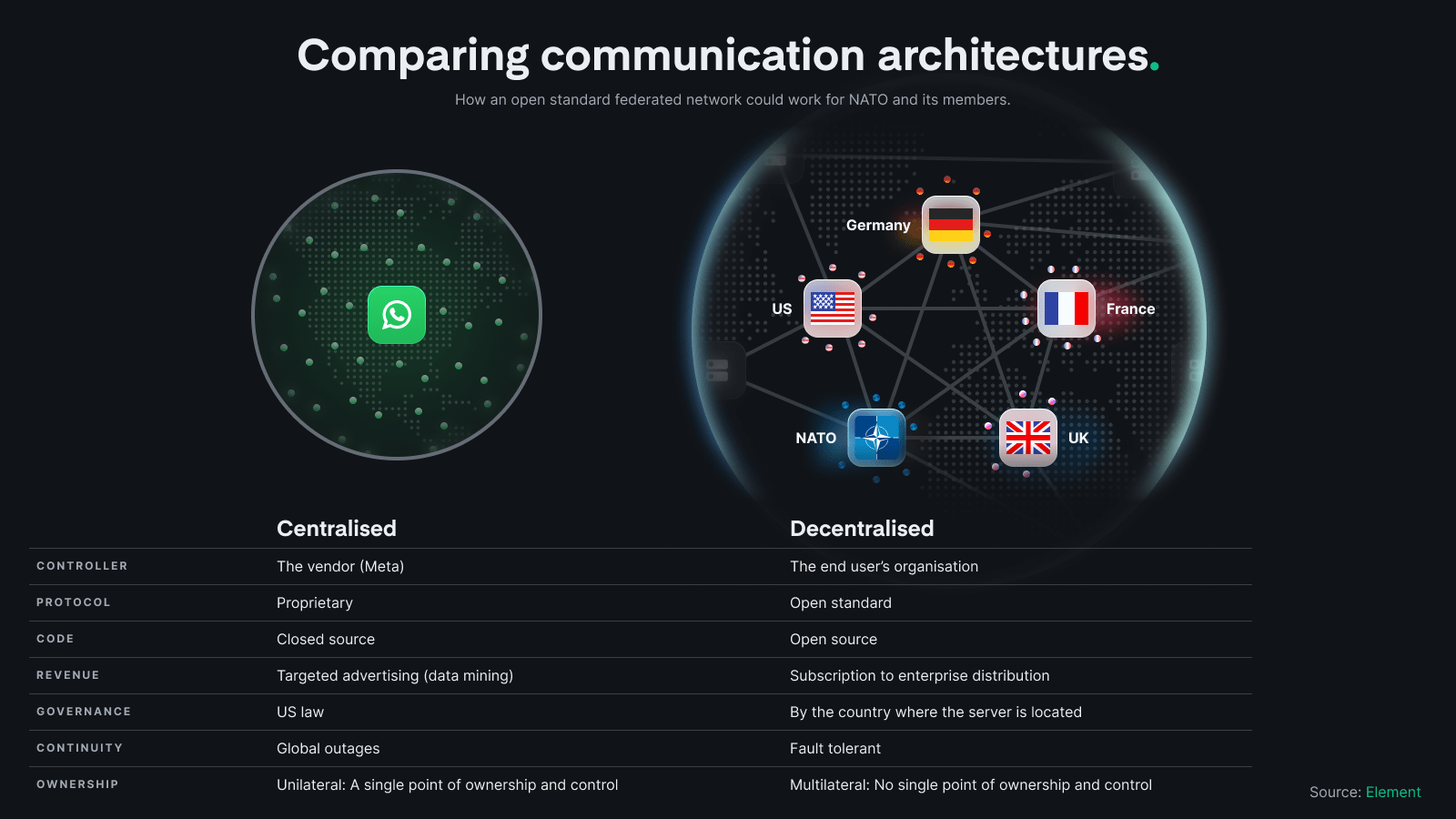Fast Company recently covered NATO ACT’s partnership with us to create its NI2CE Messenger, an exploratory initiative to investigate the potential of a digitally sovereign messenger.
For experimental use within NATO ACT, NI2CE (NATO Interoperable Instant Communication Environment) is a sovereign and secure messenger that aims to complement existing NATO communication solutions with a secure Bring Your Own Device (BYOD) style messenger for ‘non classified’ use.
In simple terms, it’s a digitally sovereign alternative to WhatsApp. The key highlights are:
- NATO ACT self-hosts its deployment (rather than being hosted by vendor-owned and controlled servers), ensuring it retains complete sovereignty of this communications platform.
- Even though it's end-to-end encrypted, NATO ACT is able to manage its communications platform in much the same way it can administer a self-hosted corporate email system. For example it can manage chat room structures, ensure easy on-boarding and off-boarding, and configure policies around auditing, data retention and moderation.
- NATO ACT worked with us to create its own app. As a starting point we used our flagship Element app and augmented it to suit NATO's branding and security requirements.
- NI2CE, like our own flagship Element app, is built on the Matrix open standard which provides secure yet interoperable real-time communications. This means, if the NATO parties involved want, it's possible to establish native interoperability between the apps. So, rather than every NATO member having to use the NI2CE app (as they would with a centralised system such as WhatsApp), entities have the option to host their own deployment and use the NI2CE app, the Element app or any other Matrix-based messenger (including a customised one) as their chosen app to connect to NATO's future federation of servers.
Open standard interoperability and federation is more than NI2CE
The fundamental power of NI2CE comes from the decentralised Matrix open standard which ensures truly multilateral native interoperability between separate deployments and different Matrix-based apps.
Each nation (department, or even individual) can self-host its own deployment, enabling every nation to ensure its digital sovereignty. It gives military organisations significant confidence that they can trust their communications platform because there’s no third party vendor (perhaps headquartered in a different country) that can impact the platform.
These independently hosted deployments can then create a powerful federation of interconnected, but sovereignly controlled, servers. Indeed Jeroen Franssen, Innovation Project Coordinator at NATO ACT, who is leading the experiment, is keen for some nations to set up their own instances to expand and strengthen the growing decentralised network, making it increasingly resilient.

(view in full size)
With all data end-to-end encrypted by default as part of the Matrix standard, what’s created is a robust, zero-trust network. The importance of a decentralised network, such as those built using Matrix, is that conversations are replicated multilaterally across all participating servers - no single entity ever owns the conversation. As a result, the network is self-healing. If a server goes down the rest of the network continues to communicate while the server is restored. Military organisations instantly see the value of this kind of network resilience. It is the core design principle at the heart of the internet.
That the resulting federated networks are based on the decentralised Matrix open standard is crucial. It means there’s no vendor lock-in, and there is no single point of control. A reasonable analogy is email; each party can choose its own email client, and manage their own deployment, while SMTP acts as the standard that interconnects everyone.
For example The Bundeswehr, Germany’s Armed Forces, has standardised on a fork of Element called BwMessenger. Much like NI2CE, it’s a customised version of the Element app and is used by more than 100k people across The Bundeswehr.
A bit of future gazing
A NATO federation could easily allow people within The Bundeswehr to connect to people within NATO. Bundeswehr employees can use BwMessenger, while those in NATO can use NI2CE. Likewise the French government uses a fork of Element called Tchap so, again, could easily join the NATO federation.
The UNICC, part of the United Nations, uses the flagship Element app. Poland’s Ministry of National Defence created its own Matrix-based messenger, Merkury 2.0, as an in-house project building from open source code. The US, UK, Ukraine, Sweden, Austria, Estonia, Luxembourg and many others are all using Matrix-based deployments too.
Interoperability and federation based on the Matrix open standard gives all participating parties the freedom to use their preferred Matrix-based client (aka frontend, or app). Where a nation is making large scale use of Matrix, such as Germany or France, it could be a custom built client, but other nations might choose to use NI2CE or a flagship app like Element. A nation might even leave the choice of which client (app) to use to individual end users.
The backend offers much the same choice, with nations able to build their own from FOSS components or subscribe to a downstream version with more functionality such as Element Server Suite.
Each of these acorns will create a mighty oak
With so many defence organisations embracing Matrix, and NATO ACT leading an experimental federation for some NATO entities, it’s a realistic prospect that the whole of the NATO alliance could one day be connected via Matrix.
With NI2CE the current focus is on mobile-centric messengers; primarily as a better alternative to WhatsApp, Signal, Telegram and other consumer-grade messaging apps. But as the adoption of Matrix grows, it’s perfectly possible that deployments will also support classified information and make use of network gateways to form high-side and low-side communication - as part of Federated Mission Networking, for instance. The result would be faster and more secure sharing of privileged communications between NATO allies.


